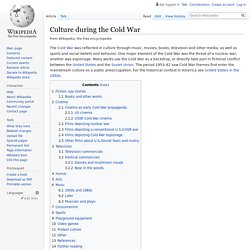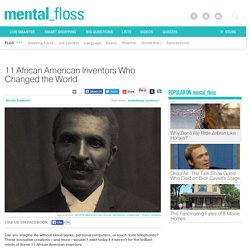

sp
Cinema as a Propaganda Agent: Hollywood Case during the Cold War. How James Bond Helped Win The Cold War. Flickr/Johan Oomen When I was growing up in the 1970s and 1980s, I took the Cold War for granted.

Whenever we listened to the early evening news, the headlines were full of Cruise missiles, peace protesters, Afghan rebels and superpower summits. When I went to school, one of my teachers lectured us about the evils of nuclear weapons and the inevitability of Armageddon. I saw James Bond battling sinister Bulgarian henchmen and canoodling with glamorous, fur-coated Russian beauties. The Cold War was always there, part of the wallpaper, the soundtrack, the fabric of everyday life. When I suggested a series about Britain's Cold War experience to the BBC, I was keen to emphasise its impact not on those people with their fingers on the button, who usually dominate accounts of the period, but on the ordinary men, women and children who grew up in the shadow of the Bomb .
Almost from the moment the Bolsheviks seized power in Russia in 1917, culture had become an ideological instrument. Cold War - America's Cold War Culture. Culture during the Cold War. The Cold War was reflected in culture through music, movies, books, television and other media, as well as sports and social beliefs and behavior.

One major element of the Cold War was the threat of a nuclear war; another was espionage. Many works use the Cold War as a backdrop, or directly take part in fictional conflict between the United States and the Soviet Union. The period 1953–62 saw Cold War themes first enter the mainstream culture as a public preoccupation. For the historical context in America see United States in the 1950s.
Fiction: spy stories[edit] Cloak and dagger stories became part of the popular culture of the Cold War in both East and West, with innumerable novels and movies that showed how polarized and dangerous the world was.[1] Soviet audiences thrilled at spy stories showing how their KGB agents protected the motherland by foiling dirty work by America's nefarious CIA, Britain's devious MI-6, and Israel's devilish Mossad.
Books and other works[edit] Cinema[edit] 11 African American Inventors Who Changed the World. Can you imagine life without blood banks, personal computers, or touch-tone telephones?

These innovative creations—and more—wouldn’t exist today if it weren't for the brilliant minds of these 11 African American inventors. Thomas L. Jennings (1791-1859) was the first African American person to receive a patent in the U.S., paving the way for future inventors of color to gain exclusive rights to their inventions. Born in 1791, Jennings lived and worked in New York City as a tailor and dry cleaner. He invented an early method of dry cleaning called “dry scouring,” and patented it in 1821—four years before Paris tailor Jean Baptiste Jolly refined his own chemical technique and established what many people claim was history’s first dry cleaning business. People objected to an African American citizen receiving a patent, but Jennings had a loophole: He was a free man. Jennings used the money from his invention to free the rest of his family and donate to abolitionist causes. Madam C.
Bullying.